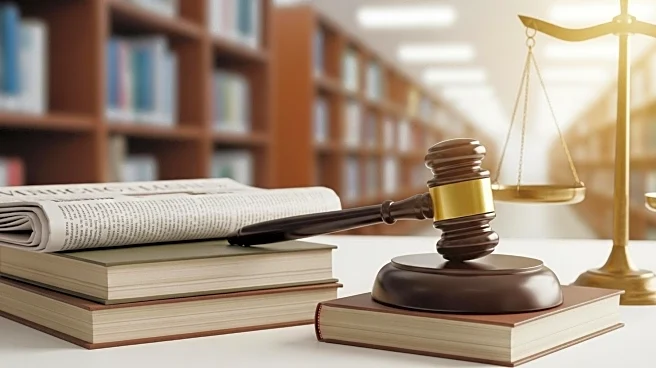What's Happening?
A federal judge has dismissed President Donald Trump's $15 billion defamation lawsuit against Penguin Random House and the New York Times. The lawsuit, filed earlier this week, was deemed 'improper and impermissible' by Judge Steven D. Merryday of the U.S. District Court for the Middle District of Florida. The 85-page complaint was criticized for its excessive length and lack of formal defamation allegations until the 80th page. The judge instructed that any refiled complaint must be concise and professional, limited to 40 pages. Penguin Random House welcomed the decision, emphasizing their commitment to First Amendment values. The lawsuit accused the defendants of crafting a book with 'actual malice' to damage President Trump, continuing his history of legal actions against publishers.
Why It's Important?
The dismissal of President Trump's lawsuit underscores the ongoing tension between political figures and media entities over freedom of speech and defamation claims. This case highlights the challenges publishers face in maintaining their role as defenders of free expression amidst political pressures. The ruling reinforces the judiciary's role in upholding constitutional protections for speech, which are vital for the publishing industry. The decision also reflects broader concerns about censorship and the importance of diverse viewpoints in public discourse. Industry leaders have expressed solidarity with publishers facing similar challenges, emphasizing the need to protect authors' rights and the public's access to varied perspectives.
What's Next?
While the lawsuit has been dismissed, President Trump may choose to refile the complaint in a revised format as suggested by the judge. The publishing industry is likely to continue facing legal and political challenges related to free speech. Publishers and authors may need to navigate increasing pressures to self-censor or face legal repercussions. The case may prompt further discussions on the balance between defamation claims and First Amendment rights, potentially influencing future legal standards and industry practices.
Beyond the Headlines
The case raises important questions about the role of free speech in democracy and the potential consequences of limiting discourse. The publishing industry's response to such legal challenges may impact its ability to foster diverse conversations and resist censorship. The broader implications for democratic values and societal resilience are significant, as restrictions on speech can weaken public debate and democratic processes.









